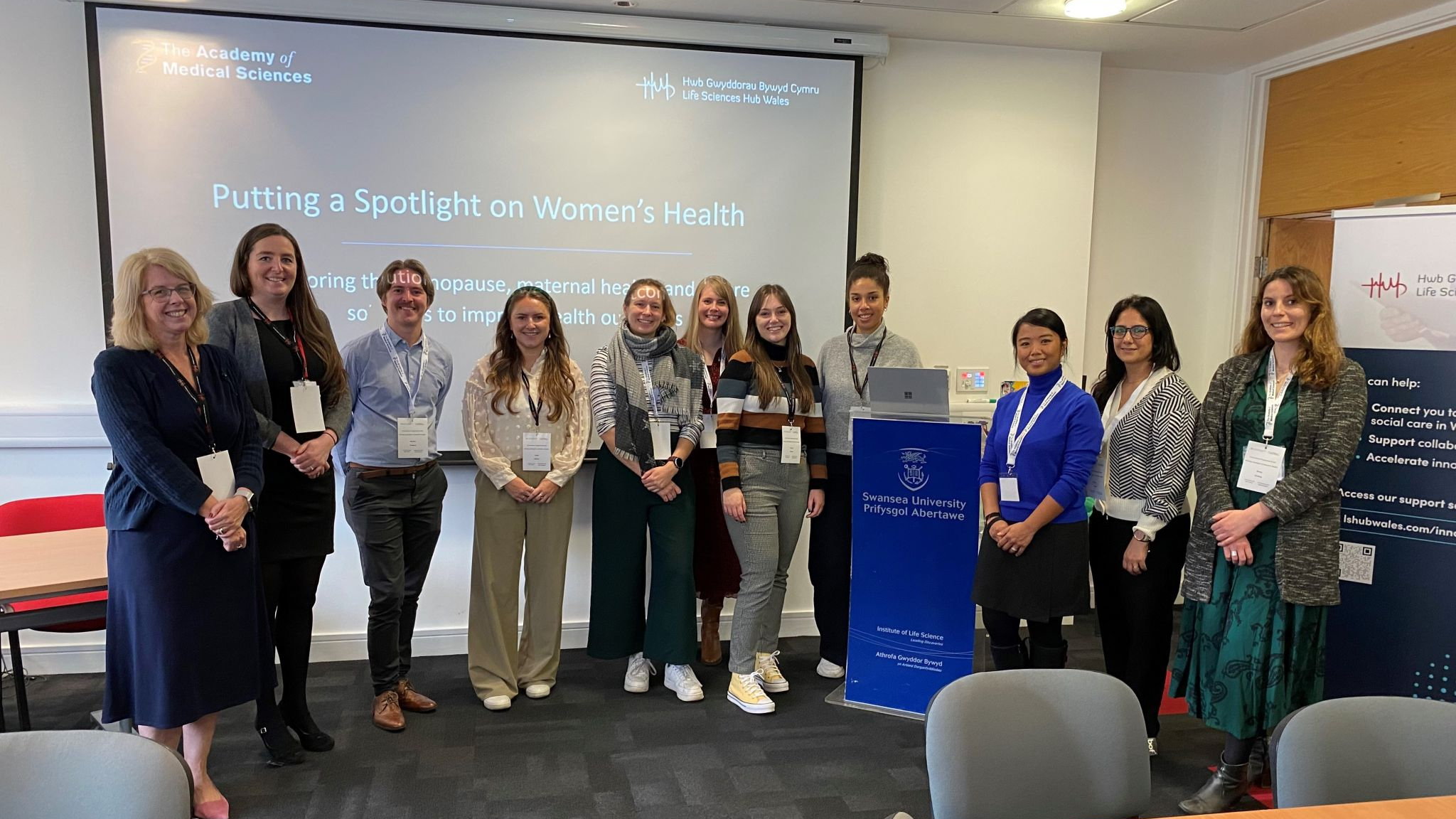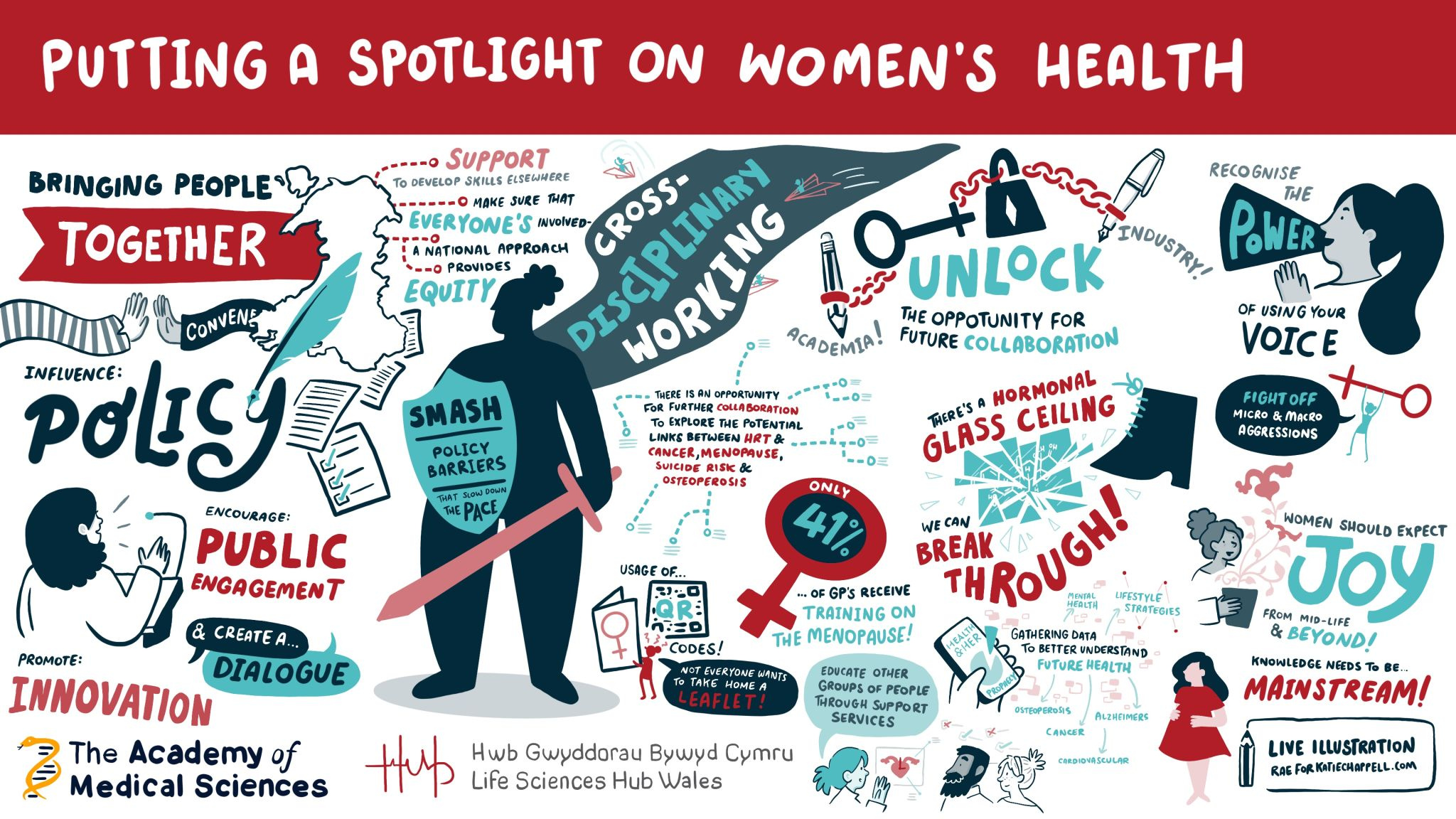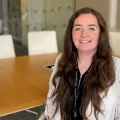We recently hosted a cross-sector collaboration event with the Academy of Medical Sciences at Swansea University.

The event buzzed with enthusiasm as innovators, researchers and professionals from diverse backgrounds gathered to delve into the world of health innovation, focusing primarily on women’s health.
Women's health needs are often underrepresented in medical research and clinical trials; however, there’s a growing acknowledgement of the importance of addressing disparities and developing tailored and personalised solutions. The event dedicated time and space to ponder and discuss the crucial topics that predominantly or exclusively impact women's health.
Chaired by our CEO, Cari-Anne Quinn, and opened by Simon Denegri, CEO of the Academy of Medical Sciences, it kicked off with a series of lightning-round introductions, setting the scene for dynamic table discussions.
One question was posed: ‘In what ways do you envision cross-disciplinary collaboration?’, prompting a mixture of responses from cross-disciplinary delegates, including GPs, nurses, and students. The discussion revolved around the need for streamlined communication between policy, academia, and healthcare, citing the positive impact such collaboration could have on women’s health.
Cari-Anne Quinn echoed this discussion, fostering hope for impactful projects:
“We can use this dynamic to understand each other better. Collaboration in any form would make things more positive. From an industry perspective, we’re discussing the approach on where we can do things nationally to address health issues, rather than with individual health boards, and collaboration is how we go about that. Making sure everyone is involved.”
The event featured three key speakers bringing their unique insights:
Amplifying patient voice for safer maternity care
Sadia Haqnawaz, representing the Baby Lifeline Charity, shared her own experience of infant mortality, emphasising the crucial need for the ‘patient voice’. Sadia took us on her journey from Patient and Public Involvement (PPI) to PhD, becoming a pivotal voice on the infant mortality task force.
Baby Lifeline is a unique charity whose mission is to make care safer and better for every pregnant person and new-born baby in the UK and worldwide. The charity supports and works with NHS professionals at the heart of care.
Sadia’s passionate talk emphasised the importance of patient representation and the need to make sure that every voice is heard. Sadia’s experience demonstrated the profound impact of collaborative efforts in making maternity care safer and more effective:
“If I am one voice being heard, imagine the possibilities and positive outcomes when many voices are heard.”
Shaping corporate awareness on Menopause
Jayne Woodman, Founder of The Menopause Team, highlighted the lack of awareness about the menopause in the corporate world. Presenting staggering statistics about the challenges faced by menopausal women, Jayne emphasised the need for education and understanding.
There’s approximately 13 million menopausal women in the UK. The majority of women undergo menopause between the ages of 45 and 55. Each year one in 10 women (equivalent to 333,000 annually) leave their jobs, and one in five reduce their working hours. Many women don’t understand their symptoms leading them to becoming overwhelmed, or feel they can’t tell their managers about their absence from work due to menopause symptoms.
Jayne also emphasised that the charity’s research found a lack of menopause education for UK doctors. 41% of universities offer no mandatory menopause training, indicating the lack of knowledge about management of menopause.
The Menopause Team’s mission to raise awareness highlighted the broader societal impact of addressing menopause in the workplace, and how they can help employers and employees work with the menopause.
Propelling women’s health through collaborative research
Robin Andrews, Data Scientist and representative for Health & Her, presented a data-driven approach to supporting women during perimenopause and menopause. The collaboration with academic institutions, Swansea University and The University of South Wales has ground-breaking insights.
Founders Kate Bache and Gervase Fay launched Health & Her in 2019. The website offers a wealth of resources, ranging from medical and lifestyle articles to projects designed to relieve menopausal symptoms. One stand-out feature is the online symptom tool, empowering women to actively participate in understanding and managing their menopausal and perimenopausal symptoms.
In the first month of Health & Her’s website being launched, the symptom tool resonated with over 14,000 women. They then embarked on an Accelerate project to explore menopausal symptom clusters within this data. The derived clusters provided rich information on the different symptom experiences of women, which found that tracking symptoms over time emerged as a powerful catalyst for positive health outcomes including:
- Reductions in menopausal symptoms.
- Increased awareness of what impacts symptoms (i.e., stress, weather, diet).
- Increased help seeking.
- Increased communication with medical professionals and friends/ family about menopausal symptoms.
- Heightened ability to make decisions on medical treatments.
The work conducted with Accelerate informed the development of Health & Her’s award-winning supplement range. Recognising the need for a more comprehensive solution, Health & Her launched their app in October 2020. The app includes symptom logging, trigger logging (stress, diet, weather), period tracking, activities designed to ease symptoms, and expert articles to provide information and support.
From a global health perspective Health & Her’s commitment to collaboration with academia has continued to shape research and enhance the well-being and life expectancy of millions of women.
In summary, the Academy of Medical Sciences cross-sector event was a shining example of collaboration, highlighting the significance of interdisciplinary efforts in advancing women’s health. The stories shared by key speakers emphasised the transformative power of bringing together diverse perspectives, experiences and expertise, leaving delegates inspired to continue the journey towards a healthier and more equitable future for women.

If you didn’t join us at the Academy of Medical Sciences Cross-Sector event and want to learn more about how we can support you in propelling innovation to the health and social care frontline, then please get in touch by emailing hello@lshubwales.com.

